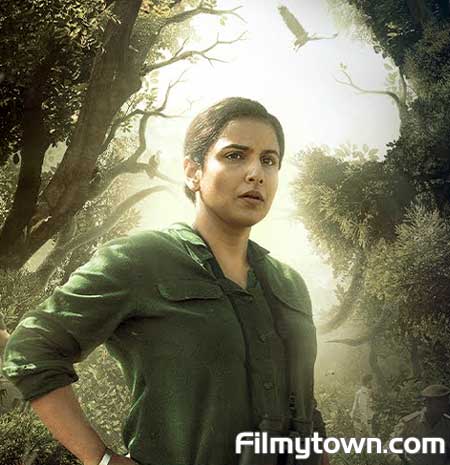A movie without any hype, however it is a refreshing tiger tale, providing succor from the mundane commercial cinema. The Sherni here does not allude to the heroine or her character in the movie, Vidya, but is about an actual tigress T-12 who has now turned a man- eater. The wild cat is on her trail that everybody is on and so is the film.
The Forest Department’s officer Vidya Balan wants to contain the damage that the tigress is causing while jumping from jungle to jungle along with her two cubs to find a final resting place. She wants to save the animal and human life both, from men who find hunting down wild animals as their passion and gives them a machismomatic kick.
Sherni is about forest conservation and how human civilization co-exists along with the wild and how both are dependent and also take care of each other. However some elements, specially the political kind, have their vested interests and as election nears, electioneering too gets amplified creating havoc for both the human society as well as the wildlife. The movie is in a docu-drama format about forest and wildlife conservation.
It has magnified the issue where all the laws are in place in the country which provide protection to forest and wildlife but no one apart from the locals seem to bother about them, least of all the politicos who would rather if not break the laws but would certainly bend them only to prove their own one=upmanship.
Performances by the lead actors is thankfully low key which suits the script to the T. The film has been kept very real and to the topic at hand without delving much into the lives of the lead characters. Except for the stereotype boisterous Punju mother-in-law and the couple’s dilemma or decision of not having children or quitting the job they are alll woven into the story without actually digressing from the story line.
As the game becomes bigger and murkier ideologies fail and fade away and one comes face to face with brass-tacks an ideal person does not waste his time on idealism but rather grabs the opportunity to show his materialistic side like the character played by Neeraj Kabi (good to see him after a haitius on OTT). The beauty of this very well crafted movie is that it sticks to the script and is very real, few cinematic liberties have been taken. Vidya Balan as Vidya Vincent in a totally de-glamorized avataar is absolutely believable in a well-defined role which she essays with great dexterity and ease.
Others in the cast including Brijesh Kala and Vijay Raaz play their parts well, Sharat Saxsena as Pintu bhaiya is there to provide the villianous track. To sum up the movie in a few words we can say it is a slow movie but thankfully close to reality with no character possessing supra-cinematic powers, no over the top name calling, no unnecessary jhagda fasaad. All characters remain within their brief. Anything like anger against the system is kept real and there’s no confrontation as such,, except at the very end when the protagonist has a confrontation with her idol who has gone on to the other side.
All in all Sherni is a watchable movie on a Sunday afternoon. One should celebrate this breed of young energetic and out of the box thinking directors, who despite keeping things near reality still provide you with wholesome entertainment. I sincerely hope that this breed only grows and does not diminish at the hands of commercial viability of cinema in our country which churns out the highest number of movies every year. Sherni has been released on Amazon Prime Video.
– Review by PAWAN GUPTA
Cast of SHERNI:
Vidya Balan as Vidya Vincent
Mukul Chadda as Pawan
Neeraj Kabi as Akhil Nangia
Vijay Raaz as Hassan Noorani
Sharat Saxena as Ranjan Rajhans aka Pintu
Brijendra Kala as Bansilal Bansal
Gopal Datt as Saiprasad
Ila Arun as Pawan’s Mother
Sampa Mandal
Suma Mukundan
Ashwini Ladekar
Credits & crew of SHERNI:
Produced by Bhushan Kumar, Krishan Kumar, Vikram Malhotra, Amit Masurkar
Directed by Amit Masurkar
Story & screenplay – Aastha Tiku
Dialogues – Amit Masurkar, Yashasvi Mishra
Music by Naren Chandavarkar, Mayur Narvekar, Benedict Taylor
Cinematography by Rakesh Haridas
Film Editing by Dipika Kalra




